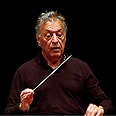
Mehta: We didn't stoop to protestors' level
After overcoming pro-Palestinian protestors' provocation in London, Israel Philharmonic conductor learns of Italian tenor Salvatore Licitra's death. 'I'm devastated,' he says
In an emotional interview from Lucerne, Switzerland, he talks about an extraordinary singer and friend and about the great loss suffered by the world of music.
"I'm just devastated," he says, as if to himself. He repeats the sentence again and again: "It is, after all, such an unnecessary death."
Throughout the day, he continued to receive details about the accident. Now he sounds tired and sad. "I heard all kinds of details and I'm shocked, I can't tell you how much. He was pure pleasure for conductors. He was an excellent singer, an intelligent musician and a wonderful actor on stage.
"He was with us in Israel only last year with 'Il Trovatore', and last November he sang in the 'Force of Destiny' which I conducted in Florence. He was also supposed to join us on a trip to Japan, but the Metropolitan Opera wouldn't let him go. I'm so sorry, I can't express in words how much it hurts."

People say there are not so many excellent tenors left, especially not of his kind.
"No, no, not at all."
So what was so special about his presence?
"It's a combination of a very beautiful voice and musical intelligence, which comes naturally to him. His pronunciation was similar to that of Pavarotti. I say Pavarotti because beyond everything else, he had an unusual pronunciation of the Italian language.
"Salvatore had it too, very similarly. He had great dictation, a wonderful sense of music. For me, as a friend and conductor, I feel it's a very big loss."
The maestro sighs. He has a free evening ahead of a concert and he's resting in his hotel room in Lucerne. The Israel Philharmonic's concert tour, which was launched at the BBC Proms festival in London last week, and received a particularly noisy welcome from pro-Palestinian protestors who infiltrated Royal Albert Hall, has been carrying on successfully.
"It was an exhausting experience," Mehta replies when asked how he felt that evening in front of protestors waving Palestinian flags and calling for the boycott of Israel and organizations supported by the government.
As he recalls the incident, the maestro is filled with energy. Like a proud father he says, "You should have seen the orchestra players. They behaved so well on stage. Despite the disruptions – and I'm convinced that there were those who surely wanted to punch the protestors – they acted like respectable men and women and maintained their composure.
"We didn't stoop to their level. We had the upper hand the whole time."
It's interesting, the orchestra players spoke highly of your composure. They said your response was grand and that you didn't let the protestors confuse you.
"I would never give them the satisfaction, under no circumstances. And above all, in spite of all this, the orchestra played wonderfully. It could have knocked them out of focus, after all, the Webern piece they were playing was definitely not a simple one and they were very attentive. They withstood it courageously."
Were there moments when you felt afraid?
"No, no, no. There's no question of fear. You should have seen the way the audience was on our side, it was touching. At first the audience was shocked, and then they began listening to the protestors. I thought there would be those who would be sympathetic toward this protest, but that didn't happen.
"After a break we started playing again, and the shouting began again. I must say they were very organized. They bought tickets, and after all, when people buy tickets you can't ask them for a passport. By the way, I don't think there were only Arabs there."
Are you concerned that anti-Israel boycott calls and such actions by protestors will make it difficult for the orchestra to perform in Europe?
"Ask me this question after the tour. For now the concert tour is being held as planned. Everything's okay."
- Follow Ynetnews on Facebook










